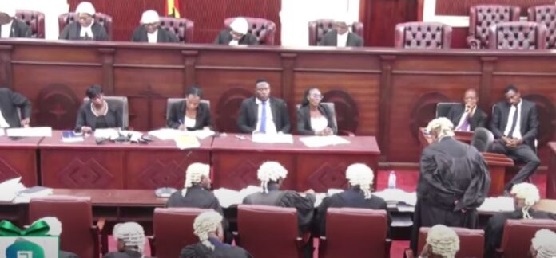Breakdown of Supreme Court Decision on re-collation for Non-lawyers
It is important to indicate that the matter of Nsawam, Ahafo Ano, etc are not foreclosed. Those seats may be challenged in court by a different kind of action.
- Advertisement -
- It started by the EC and NPP’s determination to steal a few of NDC’s seats to reduce the latter’s 2\3rd majority.
- The only way to achieve that is to try to re-collate parliamentary results in a few constituencies that were outstanding, and where there were little controversies leading to their declaration.
- They found nine (9) constituencies, including five, which had already been declared for NDC.
- When they started the “re-collation” exercise, NDC ran to court with an application to stop the process.
- The NPP candidates also ran to court seperately to obtain the authority of the court (court order) with police protection for the re-collation to continue.
- They went to court by way of a judicial review referred to as application for Mandamus. It is an order directed at a public institution to perform a duty required of it by law, but which the institution is refusing to perform. In this instance, the EC is by law required to collate parliamentary results, and NPP’s application in court was that the EC is refusing to perform that duty, so the court must order it to do so.
- So, this kind of action is against the EC only. The NDC was not a party to it at all. Also the NPP cannot disclose that any of those constituencies was already collated and declared. Mandamus is to compel the institution to do that which the law requires the institution to do, but the institution is refusing to do. Collation is what is required, but not re-collation.
- As stated above, this order is directed at a public institution only. But all can agree with me that the order may affect the interest of others who may not be parties to the application. For instance, if the EC is ordered by the court to collate (actually, re-collate) the results, the execution shall affect the interest of all contestants in the parliamentary elections. Again, here, the interest of those NDC candidates that had already been declared would be affected. Such people are called “Interested Parties.” By the rule of natural justice, interested parties must always be heard before a decision is made, which may affect their interest.
- In mandamus applications, the applicants may, or may not include interested parties, so that they can be heard by the court straightaway before the court decides the matter. If the applicants fail to include the interested parties, the court may order for them to be joined, or those parties may apply by themselves to join the action, and the law is that they must be allowed to join and be heard.
- In NPP’s mandamus application, none of the NDC’s candidates was a party, and served. But on the day of hearing the application, all of them were in court, and their lawyer begged the judge to allow them to join the action and be heard, but the judge refused and went ahead to order the EC to do the collation (re-collation). This was the order (error) the NDC candidates went to the Supreme Court today to get the Court to correct. Remedying it means the order and all actions consequent from the order shall be quashed (cancelled).
- So, today in court, the Supreme Court upheld the law (agreed with us) and quashed the order made by the high court on Friday, and also all the re-collation that emanated from the order.
- I am still not very sure why Obuasi East was not mentioned specifically, but I am checking. As for Nsawam and Ahafo Ano and another were excluded because they had not actually been declared before the mandamus application. Also, Obuasi East may be presumed to be included since it is logical that its re-collation was predicated on the order for mandamus. Similarly, Dome Kwabenya does not have to be re-collated because it was going to be done under the same order which was quashed today.
- It is important to indicate that the matter of Nsawam, Ahafo Ano, etc are not foreclosed. Those seats may be challenged in court by a different kind of action.
- Now, if this kind of application is determined by the Supreme Court as not properly handled by the high court, they shall be referred back to the high court with specific orders by the Supreme Court as to how they must be handled. Accordingly, in today’s ruling, the SC directed as follows:
- the matter must be assigned to a different high court;
- the interested parties must be joined and allowed to challenge the application or otherwise; and
- the matter must be heard and determined on Tuesday, Dec. 31st.
- Advertisement -
What that means is that the mandamus application shall be heard all over again, but this time round, the 4, 5, or 6 NDC candidates, whose interest may be affected by the high court’s decision shall have the opportunity to file evidence that the elections were already collated and declared for them in their constituencies, and so the EC does not have anymore legal duty to collate and declare the results. If anyone is aggrieved by the declaration, they can only file a substantive election petition. The high court shall now take all the evidence and circumstances into account in deciding the application.
- Advertisement -
- Advertisement -
There are a few legal issues I have not included here. I have tried to keep it very simple for any layman to understand. I shall answer any questions that shall arise.
I hope this helps.
By Eric DELANYO Alifo, Esq.
- Advertisement -


